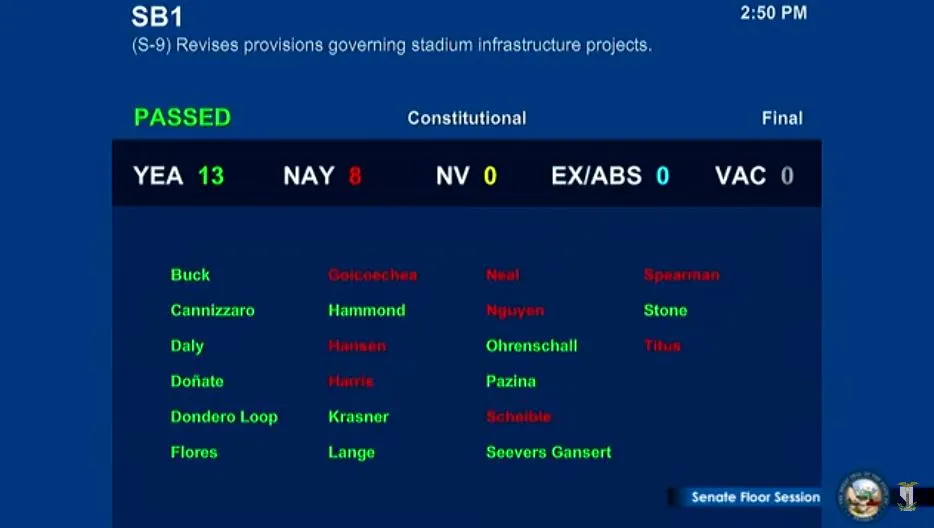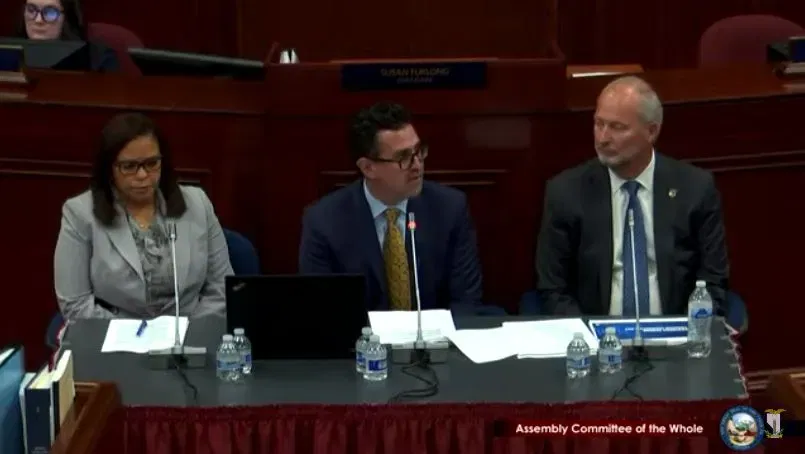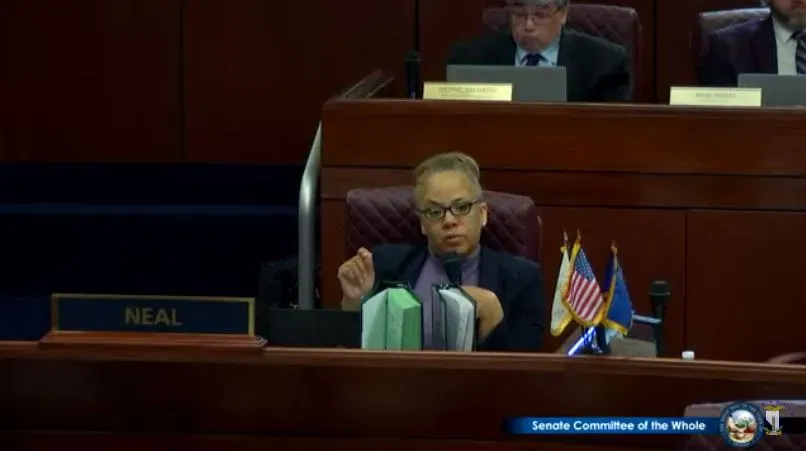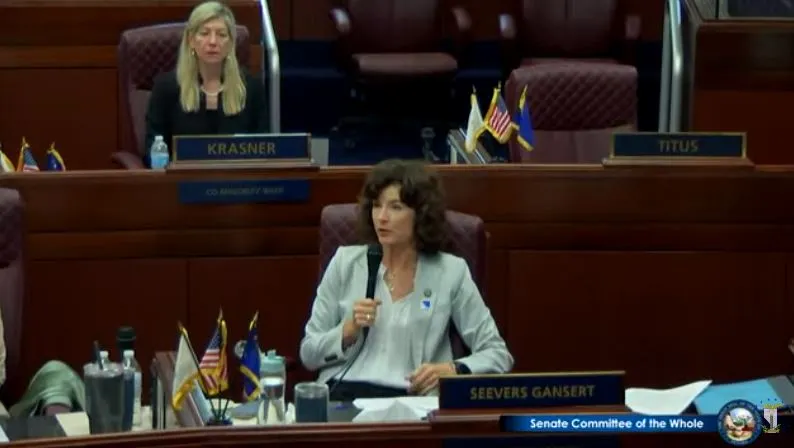A’s stadium bill approved by Nevada State Senate, goes to Assembly
by: Greg Haas
LAS VEGAS, Nev. (KLAS)- After days of behind-the scenes work, the Nevada Senate passed SB1 by a 13-8 vote, sending the bill to the Assembly.
Lawmakers worked on Tuesday reviewing an amendment to the A’s stadium funding plan in Carson City before the bill went to a vote.
The $1.5 billion 30,000-seat stadium is the subject of a special session that is on its fourth day on Tuesday. Watch for updates on the amendment and other proceedings throughout the day here:
Senate passes A's stadium funding
By a 13-8 vote (see below), the full Senate passed SB1 on Tuesday, sending the bill to the Assembly for consideration.
The bill still needs approval in an Assembly committee and from the full Assembly before it goes to Republican Gov. Joe Lombardo.
The amount of public funding for the $1.5 billion stadium is capped at $380 million, mostly in the form of bonds. The 30,000-seat stadium is planned for the corner of Tropicana Avenue and the Las Vegas Strip.
Tuesday's vote comes on the fourth day of the Nevada Legislature's special session, estimated to cost about $250,000 per day as it continues.
“I'm waiting for baseball, so all I have to say is, 'play ball,' ” chimed in Republican Sen. Scott Hammond.

“The owner of the Athletics is contributing $1.1 billion,” Republican Sen. Jeff Stone said. He described it as the biggest investment by any major league owner.
“We're putting up $180 million in transferrable tax credits,” Stone said. That's in addition to bonds to support the deal.
“Two-thirds of the $180 million is being required to be paid back to the state — that's a tremendous improvement from its prior iteration. So the net exposure to the state by helping fund this stadium is $60 million,” Republican Sen. Jeff Stone said, speaking in support of the bill.
Before the bill was amended, the A's were expected to pay back only half of the $180 million.
Challenge to economic analysis
Democratic Assemblywoman Selena La Rue Hatch of Washoe County cited statistics surrounding stadium projects in the U.S.:
- 83% of economists say stadiums are a negative investment
- 14% say the positives don't really outweigh the negatives
- 3% say it's a good idea
La Rue Hatch: “So my question is, if you're going against 97% of economists, what your qualifications are to dismiss 97% of economists. I just want to know who at your table has a Ph.D. in economics and what your credentials are to allow you to dismiss them,” La Rue Hatch said.
Jeremy Aguero (Applied Analysis): “I'm assuming that's directed at me. No one sitting up here has a Ph.D. in economics. I've spent my career studying this economy and this industry and I'm more than happy to evaluate any other analyses that are there.
“I've heard a lot about what you said. Obviously, there's been a lot of chatter that's out there. I'm not aware of any of those folks that have done an analysis here in the state of Nevada, much less in Southern Nevada and if they are, they're welcome to give me a call and we can have a conversation about our assumptions vs. their assumptions as it relates.

Jeremy Aguero, center, responds to Assemblywoman Selena La Rue Hatch during Tuesday's session (above).
Aguero: “Not surprising to get all of this because I understand where this comes from, and I want to be clear about this. Those analysts that look at stadiums and arenas around the United States are largely correct. And I want to be very clear about that. They are largely correct. If you build a stadium or an arena in a location that does not benefit from visitation the way ours would. If we took out the 40 million visitors that come a year and the assumptions of how many of them are going to come because of this facility, it would have a negative fiscal and economic impact. We got a lot of the same criticism from all of the same people.”
Aguero went through three media reports, one from Reno, one from Las Vegas and one national report published in Deadspin.
Aguero: “Assemblywoman, I've heard the criticism, I've seen it. I believe that when you look at what our state and our community has the ability to do it sets us apart. And whether I'm in the minority of the 14% or the minority of the 3% or you'd like to challenge my credentials or anyone else's to get it done, I will stand behind the analysis that's been done.”
Stadium Authority Board Chairman Steve Hill said Allegiant Stadium has performed 80% better than projections.
La Rue Hatch: “So just to confirm … much like every other community, you're telling us that our community is different.”
Aguero: Yes ma'am.
Senate committee passes SB1, amendments
Senate Bill 1 has passed out of the Senate Committee of the Whole with two amendments — 3001 and 3003. The bill was approved in the work session of the Senate Committee of the Whole, and now faces a vote of the full Senate before it can move to the Assembly.
Amendment 3001, shown near the top of this story, contains some structural changes removing the state's responsibility for backing the bonds. Clark County is solely responsible.
Amendment 3003 tacks on two pieces of legislation that Gov. Joe Lombardo vetoed containing :
- Removing an exception to pay prevailing wages in certain railroad and monorail projects
- Requirements that companies claiming tax abatements must provide paid family leave if they have 50 or more employees
The vote was 12-7, with five Democrats (Harris, Neal, Nguyen, Scheible, Spearman) and two Republicans (Goicoechea, Stone) opposed. Two Republicans (Hansen, Titus) were absent
Worst-case scenario
“If the county cannot meet the debt service from dedicated revenue for those bonds, it has to turn to the taxpayers to pay those bonds because the county has a contract with the bondholders that's protected by the contract clause,” according to Kevin Powers, general counsel for the Legislative Counsel Bureau Legal Division.
Powers said that's the case with all general obligation bond issued by the county.
County pocketbook
Democratic Sen. Dina Neal asked if Clark County can afford the commitments outlined in SB1.
“I know you've been reading the media about the county and their ability not to be able to give $40 million for this Formula 1 for the streets, asking for public money to be put up” for part of the repaving expense.
“It has not actually been established that the county can afford to do this act,” Neal said.
“Have you guys had that conversation with them?”
Steve Hill said he would rather not speak for the county, but he believes that it was really a question of priorities. “They have the ability, certainly, to execute what's in this bill,” he said.

Sen. Dina Neal, above, asks if Clark County can afford the terms of the A's deal.
Who will get tickets?
Republican Sen. Heidi Seevers Gansert asked who would be getting donated tickets and other benefits promised in the Community Benefits Agreement. She emphasized that community organizations — not politically-affiliated groups — should get these benefits.

Steve Hill suggested that the A's would take that input into account, and that was the A's intention with the community benefits.
Link to informational hearing
Watch the informational hearing here.
Assembly convenes for 'informational' session
The Nevada Assembly is convening as the Committee of the Whole to hear details of the A's stadium plan.
There will be an opportunity for public input in-person (in Carson City and at the Grant Sawyer Building in Las Vegas) and by email: asmcow@asm.state.nv.us
Any email received at that address will become part of the public record.
The Assembly is essentially saving time, hearing the bill presentation and beginning questions before SB1 has passed out of the Nevada Senate.
$380 million still the target
The A's stadium plan still caps public funding at $380 million. The maximum amount for transferrable tax credits is $180 million.
The site is no longer a question mark as the 53-page amendment pins the location to the site of the Tropicana Las Vegas Casino Resort.
Also, Clark County must create the special tax district, which contributes to the funding.
A 30-year commitment from the A's to remain in Las Vegas is included in the amendment.
New language specifies that money for the Clark County Homelessness Prevention and Assistance Fund will come from a portion of the transferrable tax credits.

Above, a rendering of the stadium provided by the A's.